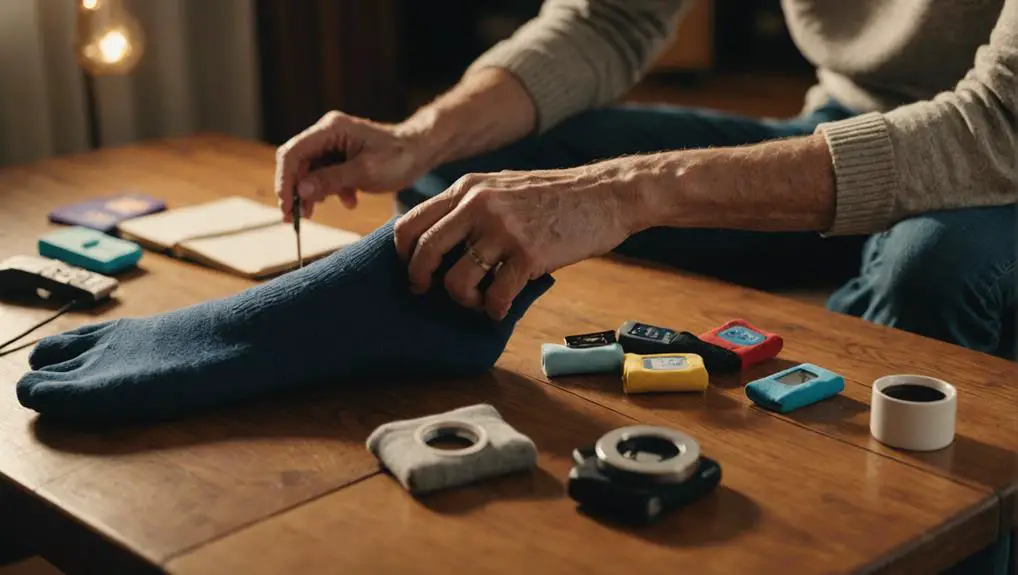What Drugs Make Parkinson’s Worse? Parkinson’s is the fastest-growing neurodegenerative condition and affects more than 10 million individuals worldwide. Its primary symptoms include loss of muscle coordination, balancing problems, cognitive impairment, and sudden tremors.
The condition is currently irreversible and incurable but can be managed with medication. These typically include Levodopa and Carbidopa, the gold standard for treating Parkinson’s.

In some cases, dopamine agonists, some specific enzyme inhibitors, and CNS depressant drugs may also be prescribed. These drugs mostly target the chemical alteration within the brain and the nervous system.
Here is a related article that might interest you on Best 10 Parkinson’s Podcasts In 2023.
There are many other drugs that can lower the effectiveness and disrupt the mechanism of action of these treatments. Some of these are explained below.
It’s important to understand that you may be required to take the following drugs for a serious health condition. You should not withdraw any medication without asking your doctor first.
Table of Contents
What Drugs Make Parkinson’s Worse
Typical Antipsychotics
Antipsychotic drugs are frequently prescribed for recurring delusions, hallucinations, anxiety, agitation, and speech difficulties. Patients with Parkinson’s often go through similar side effects when they take dopamine-inducing medication such as Levodopa and Selegiline.
However, antipsychotics such as Thorazine, Proxiline, and Orap are specifically designed to block the dopamine receptors to calm the mind. While the brand names vary, its important to avoid any drugs with the following as their main ingredient:
- Chlorpromazine
- Perphenazine
- Loxapine
- Thiothixene
- Pimozide
- Fluphenazine
- Trifluoperazine
- Haloperidol
- Thioridazine
All the mentioned drugs relieve psychotic symptoms by lowering the rate of neural messages sent to the brain by blocking the dopamine receptors.
Atypical Antipsychotics
These hold the same relieving properties as typical antipsychotic drugs but don’t cause serious flare-ups in Parkinson’s symptoms. These also work by blocking the dopamine receptors, but don’t have any long-lasting effects.
The main ingredients used only bind to the receptor for a short period of time and then release it back to healthy function. While safer, these can still lead to spikes in tremors, shaking, and cognitive problems. Some common brand names include Risperdal, Invega, Rexulti, and Zyprexa. It’s best to use drugs including the following as their main ingredient, with caution:
- Brexpiprazole
- Risperidone
- Cariprazine
- Lurasidone
- Olanzapine
- Paliperidone
- Ziprasidone
- Aripiprazole
- Iloperidone
- Asenapine
Antihypertensives
Antihypertensive drugs work by inhibiting the functions of an enzyme responsible for converting L-dopa (Levodopa) into Dopamine. For this reason, using such drugs can lead to a lowered efficacy and improvement from your Primary Medication.
You can still take drugs containing reserpine if you are at an early stage of Parkinson’s and do not take any medication for relieving your symptoms. However, antihypertensives that include Methyldopa as their main ingredient, should be avoided to prevent flare-ups or worsened symptoms.
Methyldopa decreases the overall presence of dopamine, leading to lowered muscle coordination, increased tremors, and slower mental processing. Some common brand names include Serpalan (Resperin) and Aldomet (Methyldopa).
Antiemetics
These are usually mild medications recommended for managing nausea and vomiting. These are also helpful for motion sickness and management of opioid side effects.
Antiemetics also block the dopamine receptors, which can decrease its ability to maintain motor and cognitive skills. The following drugs must be avoided to prevent tremors and other symptoms from worsening:
- Promethazine
- Chlorpromazine
- Metoclopramide
- Droperidol
- Prochlorperazine
Some common brand names include Reglan, Thorazine, Compazine, Inapsine, and Phenergan.
Safer alternatives for Parkinson’s include anti-sickness medication, which have domperidone as the main ingredient. They have the same relieving properties and do not interfere with the blood-brain barrier. Some of these include:
- Tetrabenazine
- Valbenazine
- Deutetrabenazine
Vitamin B6 (pyridoxine)
Vitamin B6 and any other pyridoxine-containing medication should be taken with caution. These can reduce the efficacy of Levodopa when taken in a dosage higher than 5 mg. However, these can still be used if your doctor has prescribed you carbidopa along with Levodopa.
The former will help you maintain the dopamine-releasing abilities of Levodopa even when you take a sizable dosage of Vitamin B6 every day.
Drugs To Avoid With Levodopa
While the drugs mentioned above can also affect the efficacy of Levodopa and other dopamine-related medication, there are other dangerous drugs that can negatively interact with it. Quetiapine is a common ingredient present in many moods stabilizing antipsychotics and sleeping pills.

These can increase the severity of levodopa side effects such as drowsiness and low blood pressure. Atorvastatin is another drug that should be taken with caution. It is present in most cholesterol-related medications and can increase the risk of nerve damage.
Nerve damage is a serious side effect of both LevoDopa and Atorvastatin. Your doctor may be able to prescribe you a safer alternative that does not interact with your current medication.
Drugs To Avoid With Selegiline
Selegiline is a common ingredient in medication prescribed along Levodopa and Carbidopa. Some common brand names include Eldepryl, Zelapar, and Deprenyl. These are designed to minimize common motor symptoms related to Parkinson’s and can interact negatively with most narcotics pain drugs, antidepressants, decongestants, and muscle relaxants.
Narcotic pain drugs can cause the worst interactions and should be avoided in most cases. While it may be hard to identify which medications fall under this category, try to avoid, or discuss with your doctor before taking anything containing Meperidine, Methadone, or Propoxyphene as its prominent ingredient. If they become a necessity, your doctor may be able to prescribe a safer alternative for your case.
Rasagiline and Safinamide are also common drugs prescribed as an alternative to selegiline. These have the same interaction with the drugs mentioned above.
Drugs To Avoid With COMT Inhibitors
COMT inhibitors are a common medication given for Parkinson’s treatment. These are used to prolong the effects of Levodopa and prevent its breakdown outside of the brain. Common Brand names include Comtan, Tasmar, and Ongentys.
These can interact negatively with other enzyme inhibitors such as MAO B inhibitors (Selegiline, Rasagiline, and Safinamide and must be avoided. Comtan (entacapone) is known for having moderately negative interactions with duloxetine (Cymbalta ), Lexapro (escitalopram), Lyrica (pregabalin), and Neupro (rotigotine). These drugs can make the side effects of COMT inhibitors more severe.
You may become more likely to experience diarrhea, dizziness, drowsiness, headaches, and confusion after their consumption. Elderly patients are at a higher chance of facing cognitive impairment. They should avoid using these drugs when taking any type of COMT inhibitor.
However, MAO B inhibitors may become necessary in conjunction with COMT inhibitors. As long as your doctor prescribes them, you should not worry about any serious interaction. Usage outside of a doctor’s recommendation should still be avoided.
Drugs To Avoid With Dopamine Agonists
Dopamine Agonists are similar to Levodopa and work by mimicking the chemical makeup of Dopamine. These are often prescribed as a second-line treatment for Parkinson’s and include medications like Neupro, Mirapex, and Requip.
Common antipsychotic drugs, muscle relaxants, and opioid pain relievers can have a moderate effect on Mirapex. It’s important to let your doctor know about all the medication you are using.
Moreover, any medication that causes drowsiness or lists drowsiness as its side effects must also be disclosed to your doctor. While they don’t have a serious impact, they can still worsen the side effects of Mirapex. If you are taking Neupro for your Parkinson’s, you must avoid, or use with caution, the following drugs:
- angiotensin receptor blockers (candesartan, losartan)
- alpha-agonists (methyldopa, clonidine)
- angiotensin-converting enzyme inhibitors (captopril, ramipril)
- alpha-blockers (tamsulosin, doxazosin)
Drugs To Avoid With Anticholinergics
Anticholinergics are prescribed to some Parkinson’s patients to control the effects of acetylcholine. These are not a primary treatment for Parkinson’s and may only be prescribed to patients with excessive motor symptoms such as tremors and shaking.
Common brand names include Congentin (benztropine) and Artane (trihexyphenidyl). Benztropine is usually given to depress the central nervous system and minimize excessive tremors and movement.
Taking Acetazolamide in conjunction with the medication can increase this ability to repress the CNS and must be taken after discussion with your doctor. Abatacept is often used to treat rheumatoid arthritis and can lead to the early dissolution of Benzatropine.
Acetophenazine is a common antipsychotic drug and can increase the severity of Benzatropine side effects. Drugs including Chlorpromazine and Haloperidol can also increase the risk of severe side effects with Benzatropine.
Some other medications that should be avoided but can be taken with caution include:
- Tiotropium
- Clozapine
- Glucagon
- Glycopyrrolate
- Methacholine
- Secretin Human
- Quetiapine
- Revefenacin
- Scopolamine
Conclusion
It’s important to remember that the enlisted drugs do not represent an exhaustive list. There may be other drugs that can impact your condition and interact with your Parkinson’s treatment negatively.
Another post that will interest you is about the Best 12 Board Games And Puzzles For Parkinson’s Patients.
Moreover, not all enlisted drugs have a severe or serious effect on your Parkinson’s. The list aims to educate patients so they can make more informed decisions.
You should not stop taking any medication listed here before seeking advice from your doctor first. If you face any surge in symptoms after taking a particular new drug, contact your doctor immediately. It’s best to disclose all the medications you are currently taking to your doctor.
This will help them prescribe the best possible combination that doesn’t disturb your other medications.

Hi, my name is Eddie, I am a professional trainer specializing in the elderly population and I’m also a website designer. I love training in the gym, going to the beach, traveling, and having good food.
I combined my love for sport and website designing to make “DisabilitEase” whose purpose is to help elderly and disabled people live a more full and active life, have more fun, and enjoy their unique journey despite any disability.


